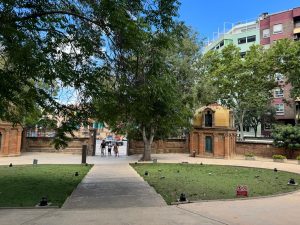On May the 2nd 2024, the Notre Dame Police Department (NDPD) violently arrested 17 Notre Dame students who were quietly and peacefully gathered on campus in opposition to the university’s financial investments supporting an Israeli military that had killed more than 34,000 Palestinians in 6 months. Their arrest laid bare the primary raison d’être of the NDPD; to protect the powerful interests at the heart of the university and to exercise violence against those who question them on the orders of the university’s administration.
In many ways, this aligns the NDPD with police forces around the world who hide their violence behind a false narrative of their own purpose, claiming they work to make citizens safer or to serve the community. In reality, these objectives are, at best, a secondary purpose behind the core function of maintaining power and a status quo of inequality and oppression, often masked in terms of “order”. Should one need a recent and visible demonstration of the actual purpose and intention of a police force, one needs only to juxtapose how Texan police officers responded to a school shooting in Uvalde two years ago with how they responded to peaceful campus protests this year. In the former case their engagement was hesitant, fatally delayed, and cowardly. In the latter it was immediate and defined by the egregious use of excessive force. If only that school shooter had posed some threat to the powers of imperialism and capitalism more children may be alive today.
In the context of the widespread global outpouring of support for the Movement for Black Lives in 2020, there were many calls for concrete policy steps towards the end goal of “defunding” the police. Regressive powers associated with the entrenched interests of capital and White Supremacy, including within the Democratic party, pushed back on those demands as “going too far”. In fact, they did not go far enough.
“Defund the police” refers to an idea which advocates transferring some of the vast material and financial resources afforded to law enforcement away from the purely securitized responses they offer to social problems and towards more holistic ways of solving those issues. It promotes diverting money from the police towards social housing, poverty alleviation, mental health resources, restorative justice models and community mediation. It is fundamentally a reformist argument in which the police force remains but is surrounded by better-supported, complementary services. Abolitionism goes one step further and demands the wholesale dismantlement of the police in their current form.
Abolitionists are not utopian; we do not deny that there are circumstances where communities can be protected by the utilization of a limited amount of defensive and restraining violence when faced by an immediate violent threat. We do not even reject the prospect of a dedicated organization or peacekeeping force to play this role. But we are committed to alternative models of community policing in this regard that are so far removed from the current model of militarized intimidation and oppression as to represent a full discontinuation of the police in their current form. Abolish the police means what it says. It is especially relevant when considering campus cops such as the NDPD.
American policing faces a multitude of systemic crises. The increased militarism of police forces aided by the adoption of increasingly repressive technologies is one such issue. This is perhaps evidenced on our own campus recently when those 17 peaceful students were arrested under the watchful eye of a hovering surveillance drone. Dystopian fears about imposed monitoring of citizens are part of quotidian NDPD protocols, apparently. Further, American police are complicit in a brutal system of over-policing and targeted violence that victimizes the most marginalized groups in the country and is explicitly implicated in the growing prison industrial complex that results in the US having the largest incarceration rate in the world.
Many universities in other parts of the world adopt formal and informal policies that not only prevent the institutions from having their own police force but actually ban police officers from campus in almost every situation. That we on our campus regularly have to share space with armed and potentially violent officers may seem normal to us but that normalization is a choice, and it is one that is far from universal when we consider the wider global academic community that we are part of.
The term ACAB was popularized in the British punk scene of the 1980s. Controversially for some, it is an acronym representing the phrase “All Cops Are Bastards”. Like many slogans and rallying cries, though, the term has taken on a symbolic meaning much broader and deeper than its original crude definition. More recently it has come to represent much wider critiques of policing and state power. It is more than an acronym. It reminds us that there can be no good police officers. No individual allies within a corrupt and violent institution. And while this is not to say that all cops are necessarily as sadistically violent or bigoted as their worst colleagues, it is a reminder that their continued membership of an organization that allows and encourages those colleagues outweighs any personally positive characteristics they may exhibit. It is a rejection of the “bad apple” narrative that is expounded whenever an example of police abuse Is revealed. ACAB. There are no good apples.
Although it is unlikely that Notre Dame will readily abandon the force it has created to exercise violence that protects the institution’s leaders and investments, abolition remains a laudable and reasonable goal, an organizing point, and a potential future campaigning issue. In the meantime, there are some simple choices we can make as individuals and activists that centre this principle.
- Do not engage with NDPD under any circumstances. This is good legal, as well as ethical, advice for any police interaction, but especially on campus. Learn what you are legally obliged to communicate in certain circumstances but otherwise refuse to offer any more. This is always your best strategy in any situation involving the police, regardless of your actions and intentions, but it also reinforces the notion that the police are unwelcome interlopers on campus. They are within our community, but they are not of it. They are violent outsiders to be treated with distrust and as such we try not to acknowledge or respond to them.
- Talk to your friends and colleagues about the issue. Police abolitionism and ACAB are often mischaracterized as extreme or violent positions. We can help to normalize them by introducing these ideas in social and professional circles, sharing a more accurate reality in which ordinary people are simply opposed to police presence and violence. Feeling anxious about a police presence and being committed to the removal of it on campus (or more widely) isn’t an extremist opinion, it’s a natural reaction to visible police violence, to our lived experiences, and it is perfectly acceptable to discuss that in all kinds of spaces.
- Organise in ways that exclude police actors. Refuse police “support” for events you are co-ordinating. Decline to offer details of those events to security officials. In conversations with the university administration, remind them that you and others are deeply uncomfortable with the presence of a militarized security force that has recently proved their capacity to exercise violence against peaceful students. Even if your event is nonpolitical or approved by SAO, having these conditions and conversations serve to make visible the opposition to police on campus for those who may not have thought about the issue before.
In many ways a call to abolish the NDPD is an aspirational one. It is a defined and specific aim, but one grounded in a clear-eyed assessment of the reality we live in and the limited prospects of immediate success. But abolition, even as aspiration, requires first steps, and those first steps include naming the problem and building coalitions for viable justice-based solutions. America has a problem with violent policing that targets the vulnerable to protect the interests of the powerful. Notre Dame proved recently that the police force here is no different in that regard. In order to protect our community on campus, it is necessary to build a network of us advocating for the complete dismantlement of the police force that threatens us.
ACAB. Abolish the Notre Dame Police Department.



